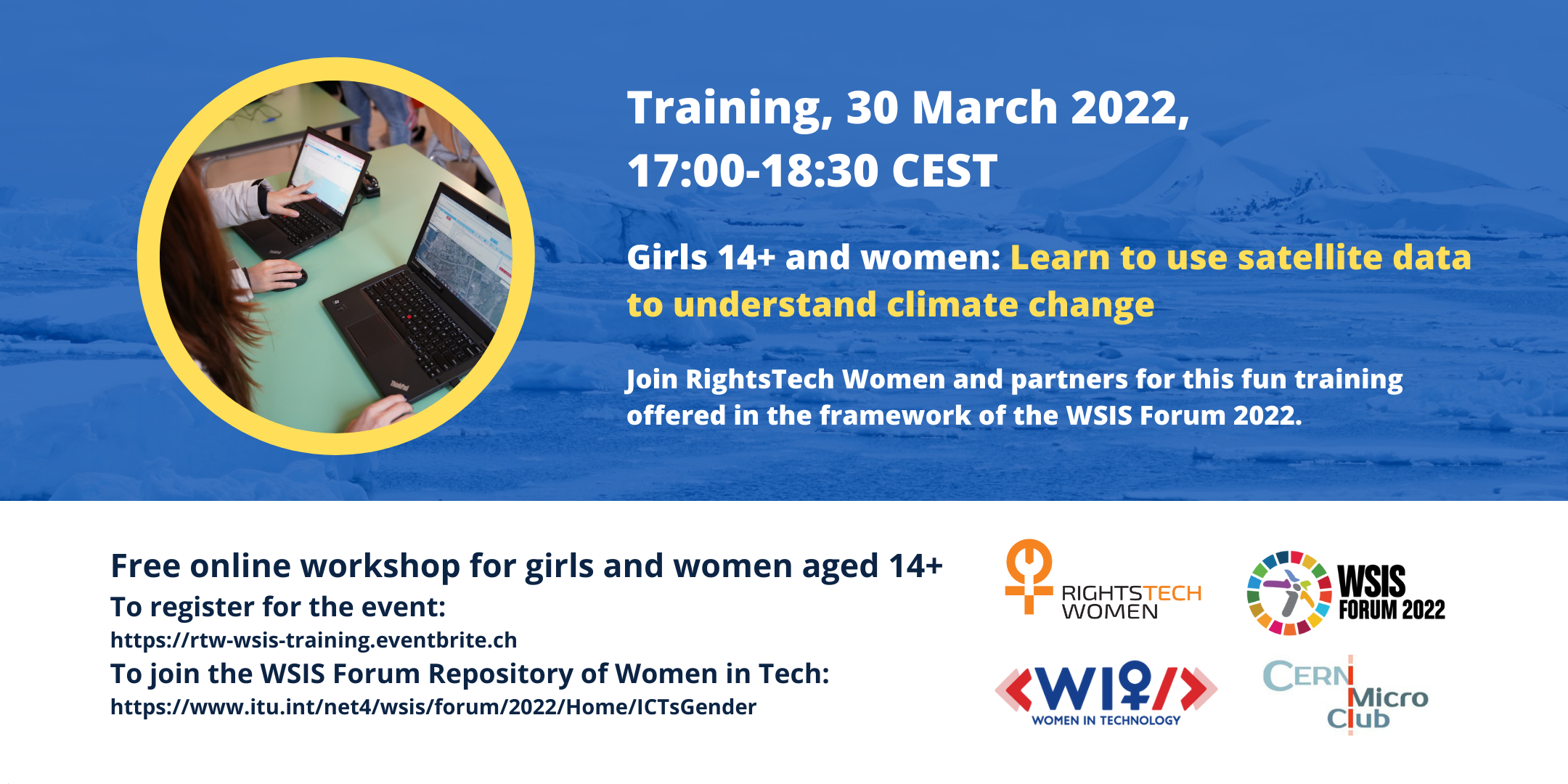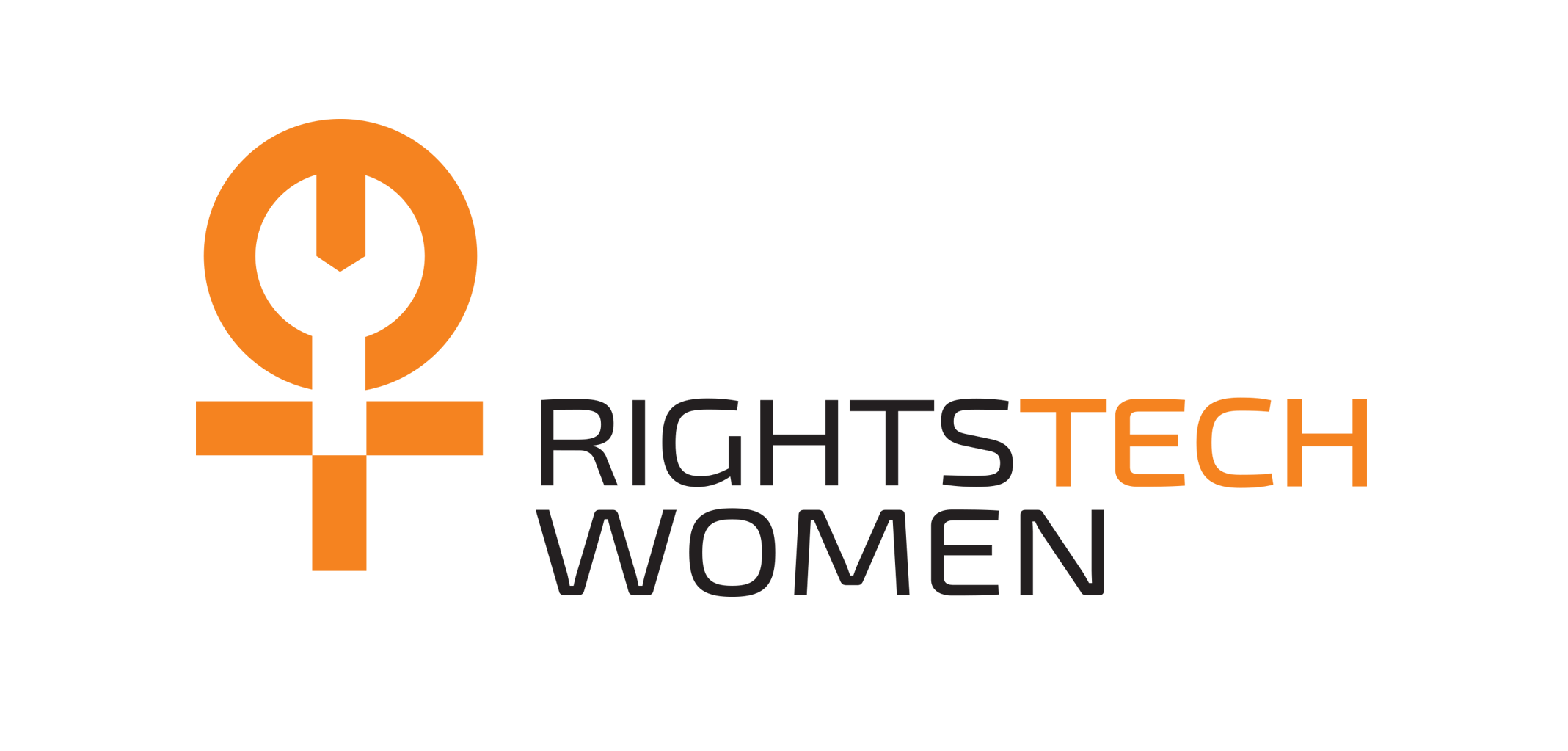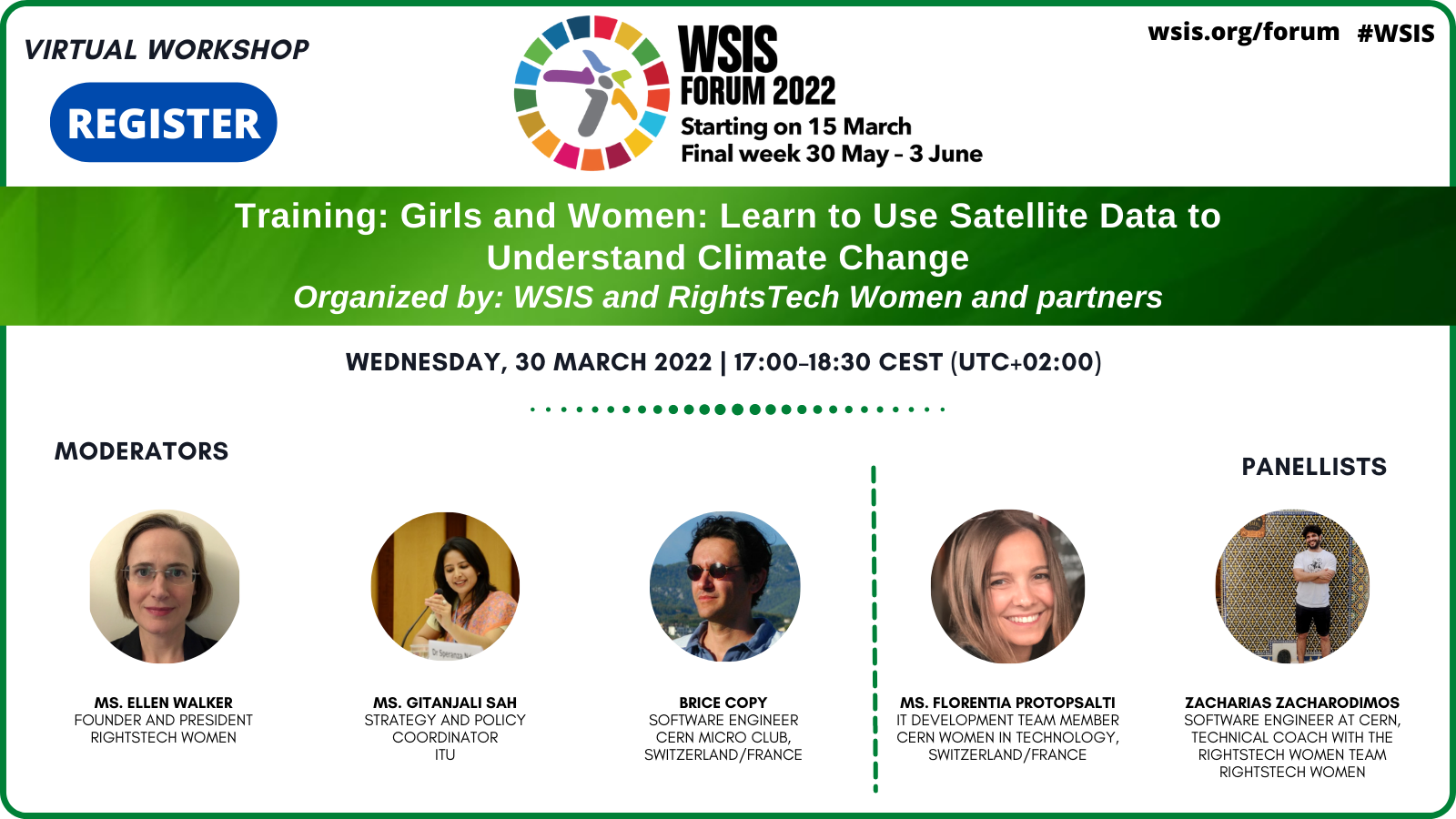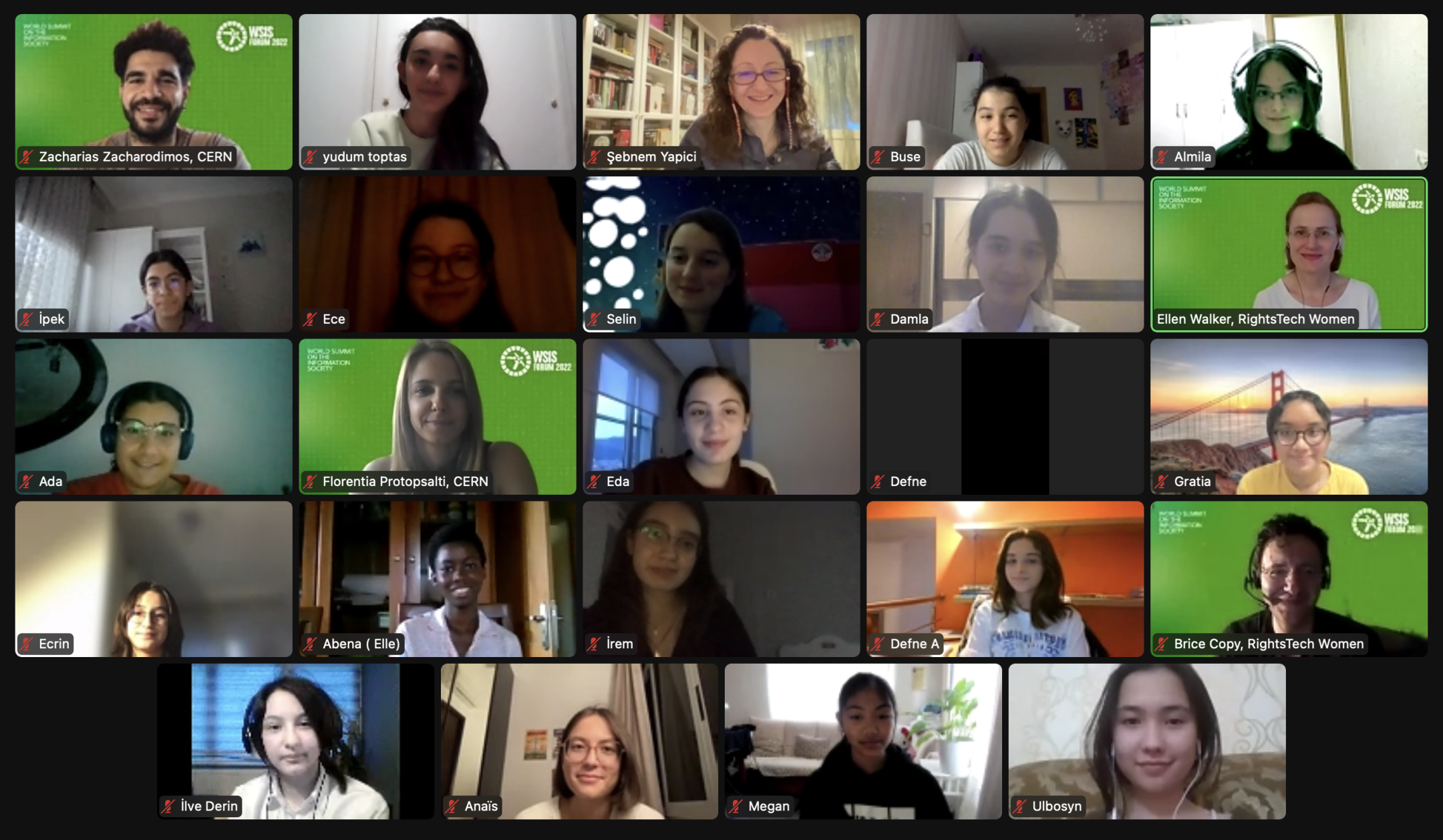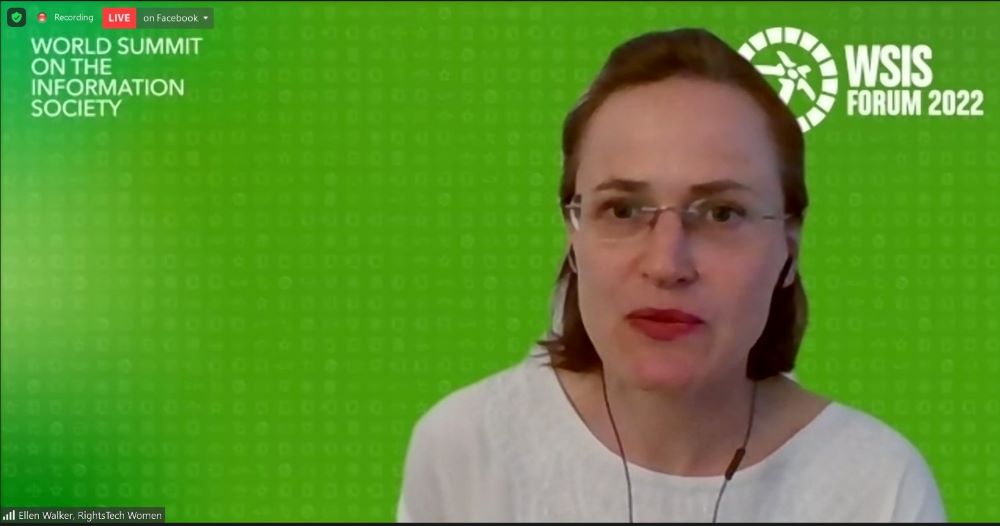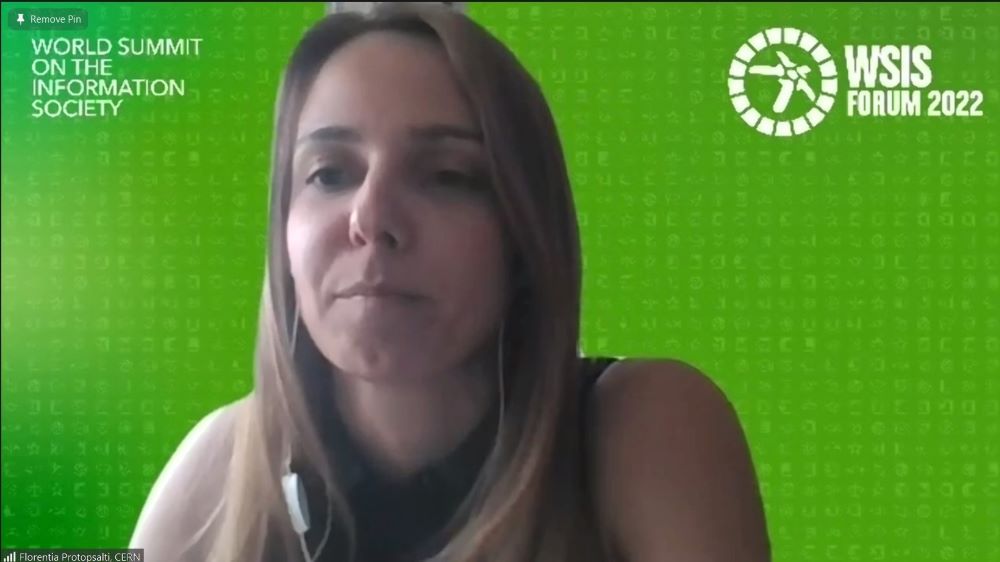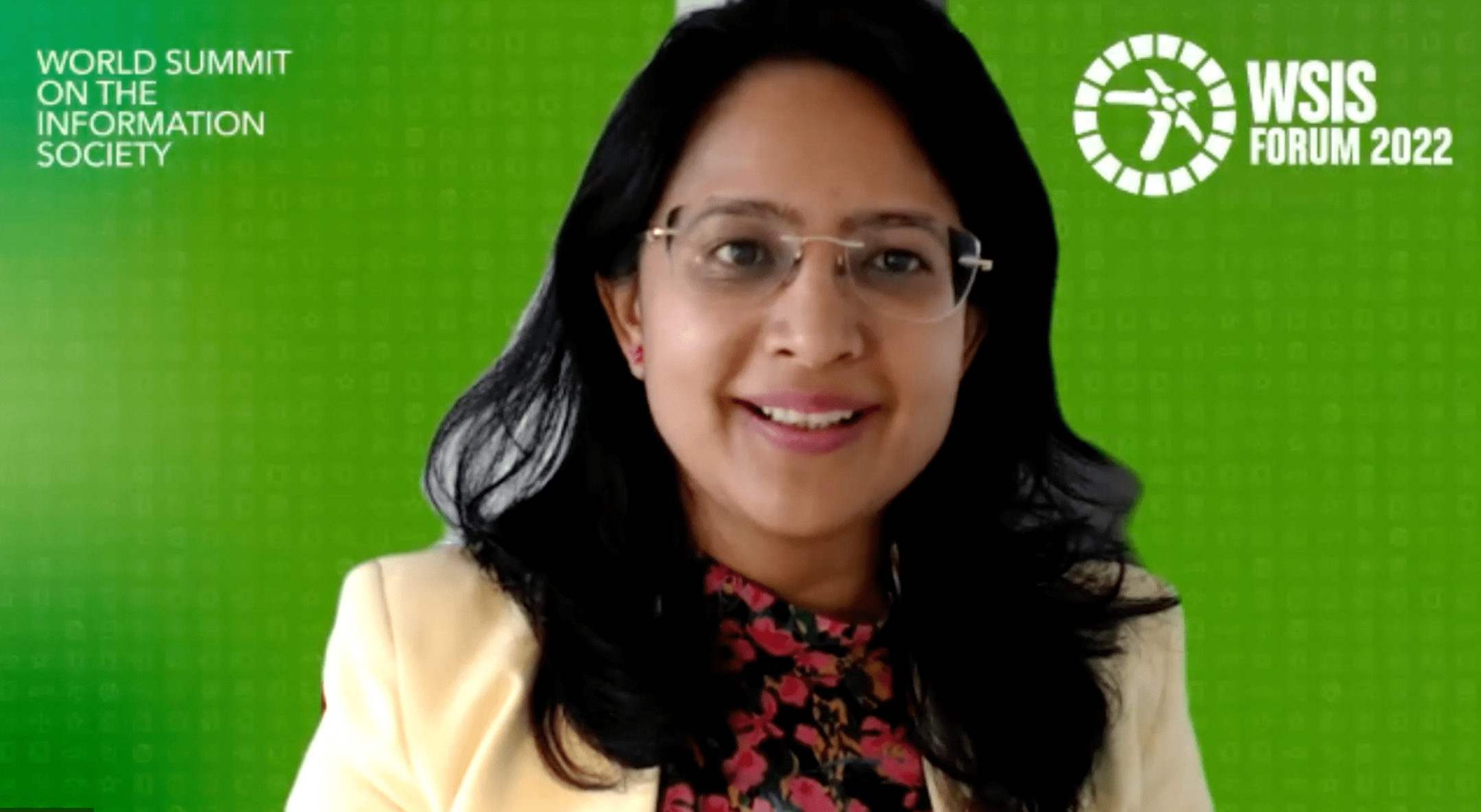Training: Girls and Women: Learn to Use Satellite Data to Understand Climate Change
WSIS/RightsTech Women and partners
Session 211

How can you use satellite data to understand climate change in your community? Join RightsTech Women and partners for an online training exploring this question. In this event:
- Gitanjali Sah from the Strategic Planning and Membership Department of the International Telecommunication Union (ITU) will welcome participants. Participants will learn about the WSIS Repository of Women in Tech initiative.
- Ellen Walker, from RightsTech Women, will share about the need to get more women working in data science, on climate change issues.
- Florentia Protopsalti, a technical coach, will share her career perspectives and experience of working in computing and data science at CERN, the European Organization for Nuclear Research.
- Our technical coaches will introduce participants to how you can apply pictures of Earth taken from space to understand climate change in your local area and around the world. We will introduce girls and women aged 14 and older to satellite imagery and the process of working with such data to investigate your own questions. We will introduce you to Google Earth Engine, a platform you can use to visualize and understand climate trends such as deforestation, temperature change, and extreme events.
This training is for girls and women aged 14 and older. We are working to get more women working in science, technology, engineering and mathematics (STEM), because women are underrepresented in these fields around the world. To make up for this difference, we organize trainings specifically for girls and women.
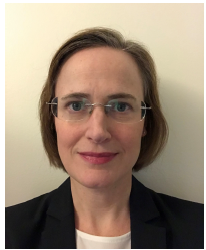
Ellen Walker is a human rights lawyer and tech learner based in Geneva, Switzerland. She innovates for gender equality in STEM by 2030. After working for many years for and with different human rights organizations, and with girls and women who faced so many problems around the world, she asked herself what she could do to help women to enjoy equality across different parts of their lives by 2030.
After much reflection, she founded the nongovernmental organization, RightsTech Women, in order to advance girls' and women's human rights in STEM education and employment. This is because of how much technology and jobs are changing right now, and how much and how rapidly they are projected to keep changing, and how under-represented girls and women are in these fields. Research shows that this under-representation is a global problem.
She was concerned that this would be a bad combination for women going forward, in terms of their economic prospects, unless many people and organizations worked together to get rid of the imbalance.
Today, with RightsTech Women, she continues to train girls and women with a dedicated team of partners and volunteers, bringing the rights to education and equality closer together with technology.
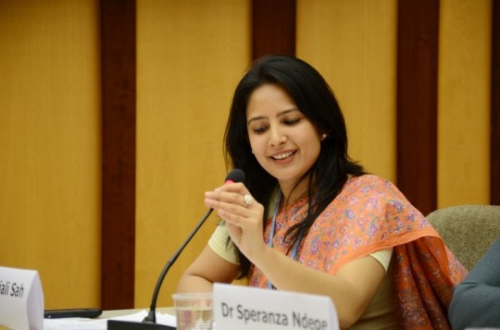

Brice Copy is a software engineer at CERN since 2003, where he works on open-source industrial control projects for the LHC and general CERN infrastructure. Prior to this, he developed the project management tools used at CERN for the construction of the LHC and other large European scientific projects. He is passionate about technology and making it more accessible to further education methods, gender equality and human progress.
Brice holds an MSc in Distributed Computing from Kent University (UK) and is fluent in English, French and Italian.
Brice serves as a Board Member of RightsTech Women and is a technical coach in RTW's trainings.
Brice also serves on the board of CERN Micro Club and organizes outreach/training events in the community.

Florentia Protopsalti received her Bachelor's degree in nursing in June 2010 from the National and Kapodistrian University of Athens, Greece. She was always passionate about science so she decided to change fields and study in the National Technical University of Athens as an Electrical and Computer Engineer. In 2017, she received her Master's degree in Engineering(MEng). For the last 5 and a half years, she works at CERN in the IT department.
At CERN, she worked Initially as a System Engineer working on a large Data Management infrastructure on every step of the building process, including the creation and management of clusters, software deployment and testing, as well as continuous integration and maintenance.
Currently, she is a development team member working on the IT Service Management tool (ServiceNow), including operational support for both the tool and Service management processes in general.
She is a Member of the CERN WIT Steering Committee and specifically coordinator of the Networking Activities.
She volunteers as a technical coach in the RightsTech Women team.
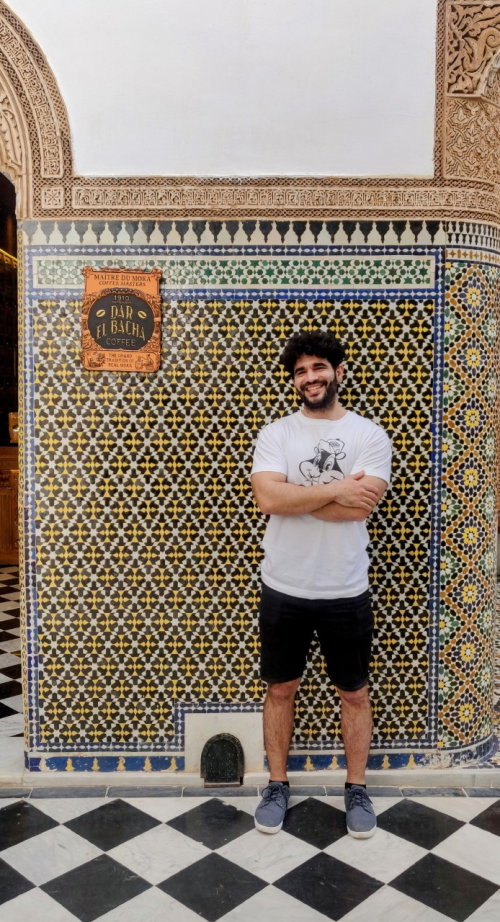
My name is Zacharias Zacharodimos and I am currently working as a Software Engineer at CERN in the CDS platform. CDS is the institution’s digital repository where all CERN’s research output is archived and disseminated. I started working for CERN 6 years ago and since then I am mainly contributing in open source projects promoting open science, open access and open data!
-
 C1. The role of governments and all stakeholders in the promotion of ICTs for development
C1. The role of governments and all stakeholders in the promotion of ICTs for development
-
 C3. Access to information and knowledge
C3. Access to information and knowledge
-
 C4. Capacity building
C4. Capacity building
-
 C7. ICT applications: benefits in all aspects of life — E-learning
C7. ICT applications: benefits in all aspects of life — E-learning
-
 C7. ICT applications: benefits in all aspects of life — E-environment
C7. ICT applications: benefits in all aspects of life — E-environment
-
 C7. ICT applications: benefits in all aspects of life — E-science
C7. ICT applications: benefits in all aspects of life — E-science
This targeted initiative helps to get more girls and women working in data science, to use Earth observation and programming concepts and tools to understand climate change in their communities.
Through this online learning, we encourage girls and women to jump into learning new concepts and to see themselves as learners and active participants in using new technologies. We demonstrate the process of working with data to solve the big problems facing the world today like climate change. We encourage girls and women by sharing stories of professional women working in data science to spark the participants' curiosity to continue learning or see how these skills can be useful for their own professional and career interests going forward.
-
 Goal 4: Ensure inclusive and equitable quality education and promote lifelong learning opportunities for all
Goal 4: Ensure inclusive and equitable quality education and promote lifelong learning opportunities for all
-
 Goal 5: Achieve gender equality and empower all women and girls
Goal 5: Achieve gender equality and empower all women and girls
-
 Goal 8: Promote inclusive and sustainable economic growth, employment and decent work for all
Goal 8: Promote inclusive and sustainable economic growth, employment and decent work for all
-
 Goal 9: Build resilient infrastructure, promote sustainable industrialization and foster innovation
Goal 9: Build resilient infrastructure, promote sustainable industrialization and foster innovation
-
 Goal 10: Reduce inequality within and among countries
Goal 10: Reduce inequality within and among countries
-
 Goal 13: Take urgent action to combat climate change and its impacts
Goal 13: Take urgent action to combat climate change and its impacts
-
 Goal 14: Conserve and sustainably use the oceans, seas and marine resources
Goal 14: Conserve and sustainably use the oceans, seas and marine resources
-
 Goal 15: Sustainably manage forests, combat desertification, halt and reverse land degradation, halt biodiversity loss
Goal 15: Sustainably manage forests, combat desertification, halt and reverse land degradation, halt biodiversity loss
This training goes to the heart of SDGs relevant to gender inequality in STEM education, employment, innovation and leadership. It works to address the under-representation of girls and women in STEM education, employment, and innovation. The material we cover gives girls and women an introduction to programming skills, and gives them a tool that, with continued learning, they can use to investigate and deal with climate change issues in their own communities. It sparks girls' and women's curiosity to see how they, too, might use these kinds of skills in their future studies and professional lives. It opens an avenue for interested women to re-skill by showing how programming can be used to work on a problem many girls and women care deeply about, namely taking care of our beautiful planet for generations to come.
Eventbrite registration: https://rtw-wsis-training.eventbrite.ch
RightsTech Women website: https://rightstech.org/rightstech-women-and-partners-offer-training-for-girls-14-and-women-during-wsis-forum-2022/
LinkedIn: https://www.linkedin.com/events/girls14-women-learntousesatelli6912412050845483008/about/
Twitter: https://twitter.com/RightsTechWomen/status/1506702001199009803
Facebook : https://www.facebook.com/RightsTechWomen/posts/1367188040423809
CERN WIT on Instagram: https://www.instagram.com/wit.cern/
CERN WIT on LinkedIn: https://www.linkedin.com/company/wit-cern/
CERN Micro Club on Twitter: https://twitter.com/CmcRobotics
CERN Micro Club on Facebook: https://www.facebook.com/cern.microclub
WSIS Forum 2022: https://www.itu.int/net4/wsis/forum/2022
